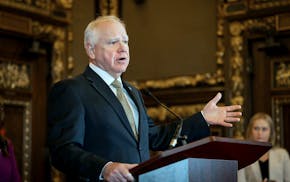Health care for thousands of Minnesotans, changes to a statewide paid family leave law, hundreds of millions of dollars for public works projects and much more are all on the line as Minnesota lawmakers feverishly work to resolve their differences and pass an approximately $66 billion two-year state budget.
Much of the most contentious work is happening behind closed doors, despite legislative leaders' pledge that proceedings would be "as public as possible."
A Minnesota Star Tribune reporter was briefly allowed into a Capitol conference room Wednesday where lawmakers were expected to negotiate the Human Services portion of the budget. Sen. Jim Abeler, R-Anoka, told a staffer who sought to remove the reporter that he thought the proceedings should be transparent.
But Reps. Mohamud Noor, DFL-Minneapolis, and Joe Schomacker, R-Luverne, soon came over and said Abeler was speaking only for himself and that the lawmakers needed to hold private discussions before opening the committee process to the public. They asked the reporter to leave.
"It's not good for the public. It's wrong," Abeler told the Minnesota Star Tribune. "How is the public going to know what's going on?"
The answer, it appears, is that much information will be presented to the public only after it's been agreed upon by legislators. Even in the one public working group meeting convened Tuesday to discuss tax policy, lawmakers recessed to discuss particulars.
House DFL Leader Melissa Hortman said private discussions are necessary to navigate touchy subjects, adding that former governors Tim Pawlenty and Mark Dayton tried to negotiate with legislators in front of TV cameras but "not much got done."
"It just doesn't work," Hortman, DFL-Brooklyn Park, told reporters earlier this week. "Because you need people to be able to say what's their bottom line, and to make their emotional pitch, and to say where their caucus is, and see where the votes are, and people really have to show their cards. So that is a space that has not ever and probably will not ever be transparent."
Even in private, though, some discussions were grinding to a halt.
Legislators on a transportation finance working group met privately in the Minnesota Department of Transportation building Tuesday night. They made little progress.
Sen. Scott Dibble, DFL-Minneapolis, was so frustrated by an offer from Rep. Jon Koznick, R-Lakeville, that he walked out.
The transportation group wasn't expected to meet Wednesday, despite a 5 p.m. deadline that legislative leaders gave members to wrap up negotiations.
Big decisions in last-minute, lengthy bills
Legislative leaders and Gov. Tim Walz negotiated for weeks behind closed doors before emerging last Thursday with a broad budget framework. The actual two-year budget, which lawmakers must pass by July 1 to avoid a state government shutdown, is comprised of more than a dozen omnibus bills — some of which are hundreds of pages long and affect policies and finances that are only tangentially related.
A number of those mega bills passed through the House and Senate before the Legislature adjourned Monday night. But some legislators complained that significant decisions, like the closing of the state prison in Stillwater, were made behind closed doors and at the last minute.
Now, rank-and file legislators are negotiating many of the remaining budget bills in private. Legislative leaders gave them the 5 p.m. Wednesday deadline to finish their work before they step in to resolve differences.
As he walked into the private Human Services working group meeting Wednesday, Sen. John Hoffman, DFL-Champlin, said "people wouldn't let me make it public." He said he hoped for the committee to hold a public meeting Thursday.
"We're close," said Hoffman, chair of the Senate Human Services Committee, referring to the working group's progress on a budget deal.
Disagreement over whether to cut funding for nursing homes is among the biggest holdups for the Human Services committee, Abeler said.
House Human Services Committee co-chair Noor filed into the meeting moments after Hoffman. He said the group was working on finalizing a human services budget spreadsheet ahead of the 5 p.m. deadline.
Asked why the panel wasn't meeting in public, Noor said, "we wanted to have conversation of what the global cuts will be, and then we will have a public discussion."
The result of the secret process that produces lengthy bills, said Don Gemberling, spokesman of Minnesotans for Open Government, is that it leaves legislators, let alone the general public, little chance to understand and critique significant legislation before it becomes law.
Gemberling said legislators are allowed to write and pass massive omnibus bills because courts have generally been lenient in their interpretation of a section of the state Constitution that says laws can only address a single subject.
One example is a 400-page bill passed in 2023 that, among many other provisions, limits the amount of lead and cadmium allowed in jewelry, toys and other household goods. Business groups are now pushing lawmakers to change that law because it outlawed the vast majority of key sales in the state.
"We passed legislation that I think has had unintended consequences," Sen. Grant Hauschild, DFL-Hermantown, said earlier this month.
This type of legislating, Gemberling said, is "just awful" from a transparency standpoint.
"I think a lot of legislators don't know what's in the bills," he said.

London-bound Air India flight with more than 240 aboard crashes after takeoff from Ahmedabad, India
Brooklyn Center police shoot man wielding chainsaw

Walz to face GOP questions on sanctuary policies at House Oversight Committee

Minnesota bolsters oversight of autism and housing programs amid fraud concerns
